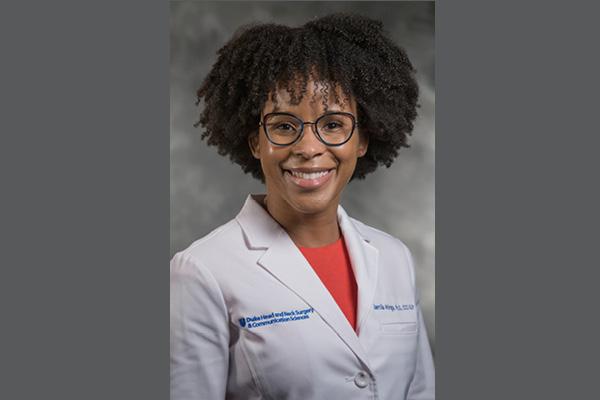
In March, Jamila Minga, PhD, CCC-SLP, a researcher and assistant professor in the Head and Neck Surgery & Communication Sciences Department at Duke University, was appointed as the Expert Consultant on a grant by the Patient Centered Outcomes Research Institute (PCORI) for the study “Advancing Use of Large Language Models in Analyzing Real-World Communication Outcome Measures in Clinical Research,” led by Jacquie Kurland, M.S., PhD, at the University of Massachusetts Amherst. Dr. Minga is also affiliated with the Department of Neurology, Stroke and Vascular Neurology Division, and the Center for Cognitive Neurosciences.
Dr. Minga is the principal investigator of The Minga Right Hemisphere Communication Lab, which is dedicated to understanding communication impairments, particularly those concerning language production, that can occur following acquired damage to the right hemisphere after a stroke.
Dr. Minga's primary research interests include adult neurogenic communication disorders following stroke and stroke rehabilitation outcomes. She focuses on the impact of right hemisphere brain damage (RHD) on pragmatic communication performance and aims to develop population-sensitive measures for determining rehabilitation needs.
In 2023, Dr. Minga partnered with North Carolina Central University (NCCU) to produce a documentary that delves into the profound impact of right hemisphere brain damage (RHD) on stroke survivors and their families. The documentary provides an intimate look at the challenges and triumphs of these survivors and features the Speech-Language Pathology program, highlighting how it navigated the ongoing communication support groups during the COVID-19 pandemic. The documentary, titled “RHD: Hidden Diagnosis,” is available for screening through PBS.
With this appointment, Dr. Minga will contribute to empirical explorations that test the utility and feasibility of language learning models in the analysis discourse for diagnostic purposes in people with aphasia, an acquired language disorder of the left hemisphere of the brain.
Dr. Minga has been awarded several grants, including one from the National Institute on Deafness and Other Communication Disorders for understanding language production after right hemisphere stroke using lesion symptom mapping (2022-2027) She is also a BIRCWH Scholar and a Whitehead Scholar.